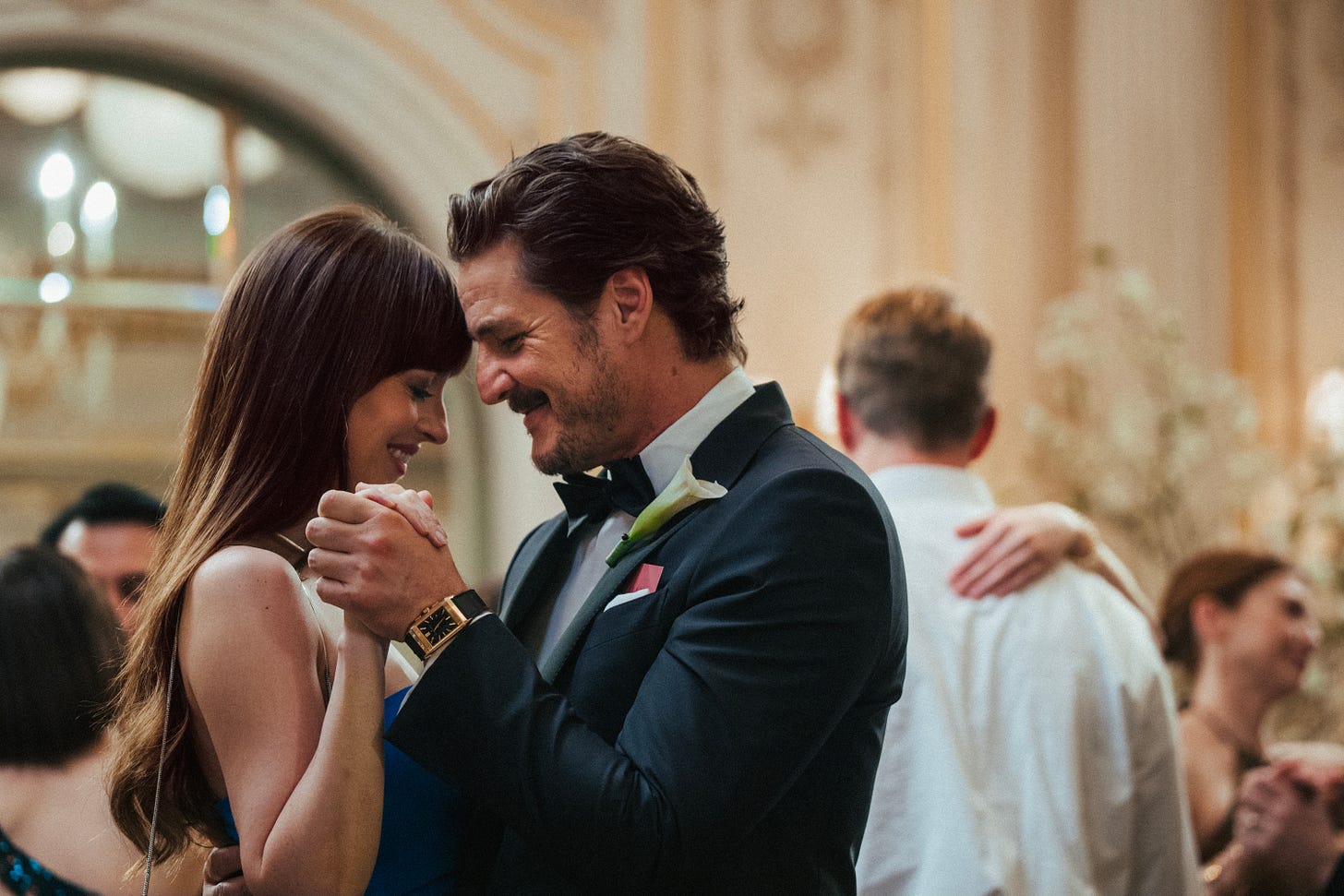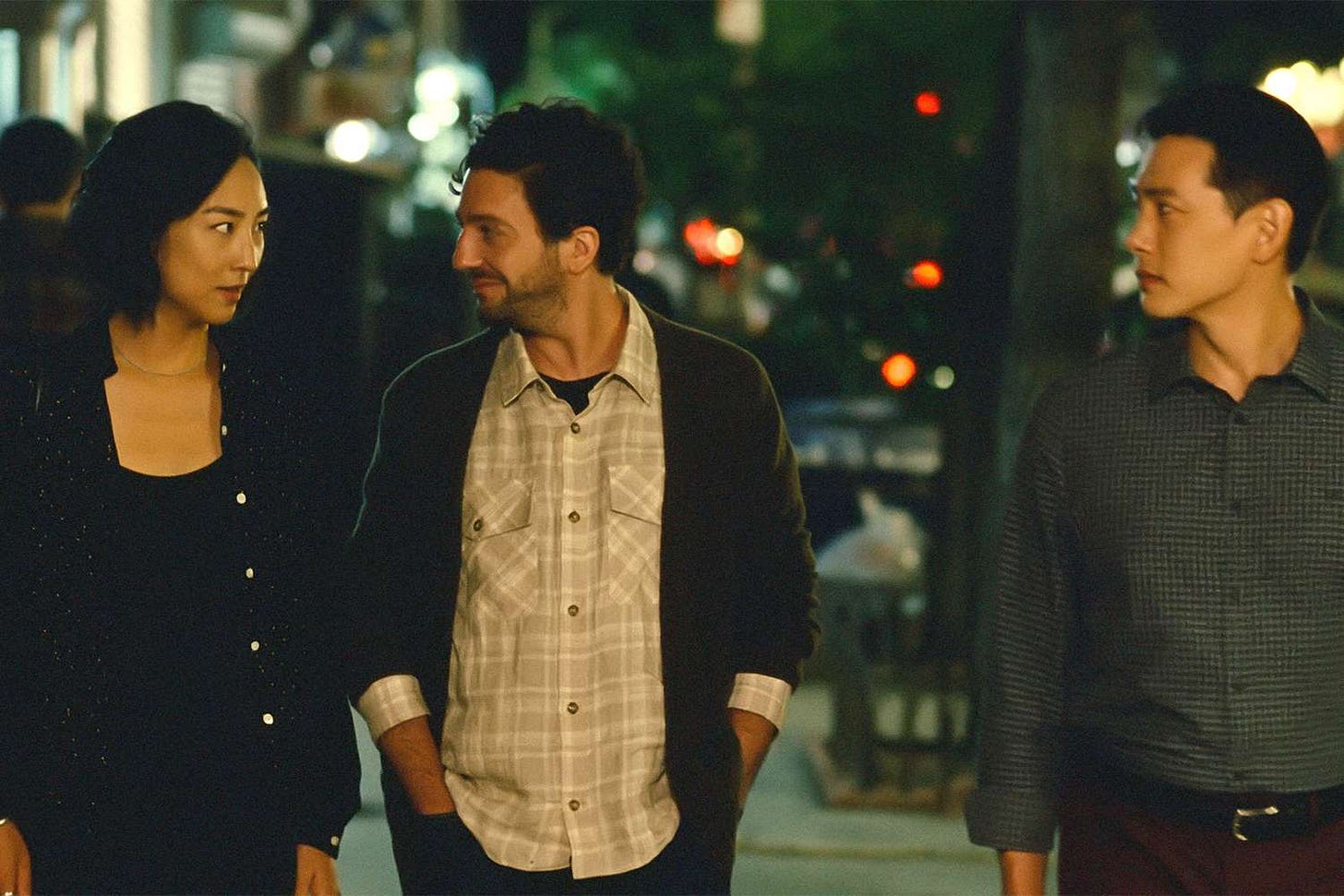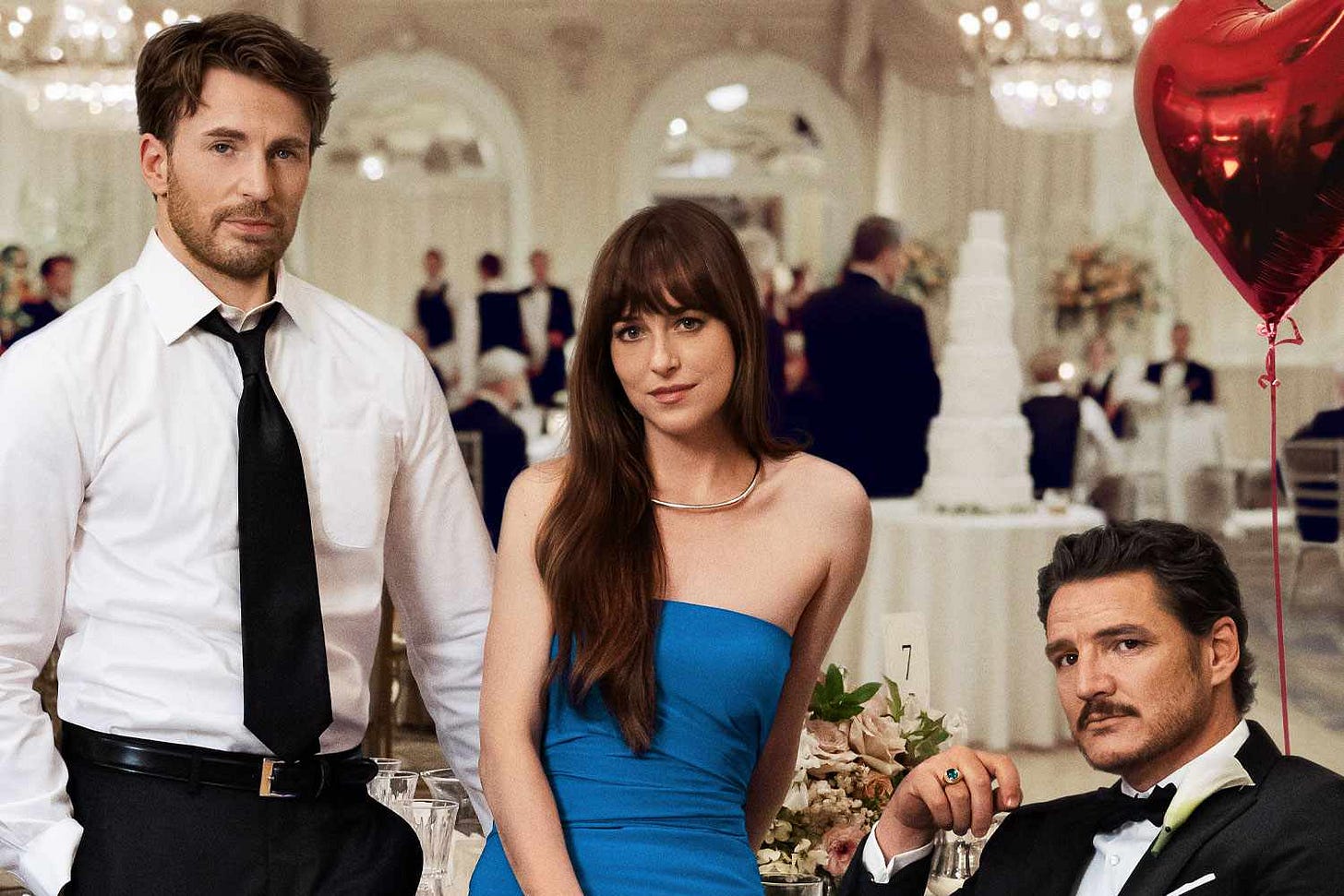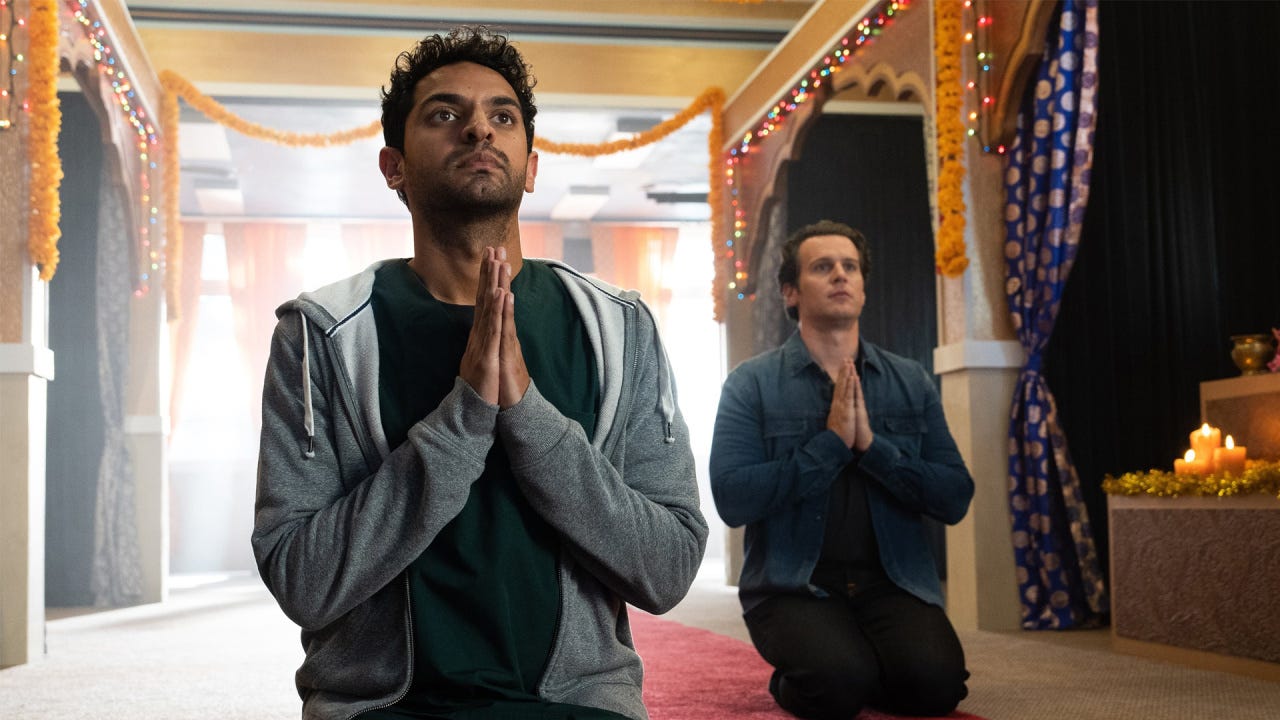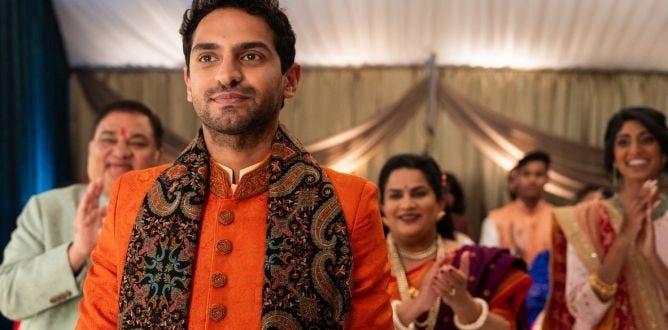Past Lives, the achingly lilting first feature from playwright-turned-filmmaker Celine Song, is a work of great beauty and my favourite film from 2023.
For me, it was as far ahead of the competition as the distance drawn between Nora (Greta Lee) and Hae Sung (Teo Yoo), two childhood friends who once shared an electrifying bond in Seoul, South Korea.
Reconnecting decades later in New York, after a brief interlude of frustratingly disconnected long-distance Skyping, the former may now be married to good sort Arthur (John Magaro), but the silken sheen of a spider’s web still sticks them together.
In both the halting spaces of that which goes unspoken and the tentative arms of what’s bravely broached, Past Lives traces a graceful meditation on who we are. On what shapes us and who we might have become, had we followed different paths – the Korean concept known as ‘in-yun’, in which many possibilities co-exist.
A delicately drawn but emotionally turbulent film in which great gaping chasms open beneath this trio across a triptych of chapters, each set 12 years apart, it caught me breathless in the mundane. In the inordinate wait for an Uber, in a confession shared at a bar, relayed twice from different angles, and the dance of a gilded merry-go-round, presenting a deft dance between love and the liminal in-between.
Layered with such simple but specific detail, Past Lives is a remarkably assured debut, a gleaming gem that only reveals more each time the light refracts through it.
Money for love
And so I belatedly caught Song’s follow-up, Materialists, at the cinema this weekend, despite hearing rumblings of discontent. After all, quite a few folks whose cinematic tastes I trust had been cool on Past Lives, which so thoroughly bowled me over.
Materialists is at least initially interested in unpicking our modern era of swipe right or left apps and other commercial machinery, from self-help books to the movies themselves, that sell connection as a commodity and single life as a failing of some sort or other.
As a stubbornly single man rapidly approaching 50 who has long since tired of those who foolishly try to nudge me into a relationship despite being able to count the ones I’ve had, for a maximum of seven months, on one hand, the idea of an anti-rom-com appeals. This, even though I adore the genre, Nora Ephron and all. Just because I don’t want one doesn’t make the idea inherently uninteresting to me in cinema.
And so Dakota Johnson, gorgeous in Cooper Raiff’s Cha Cha Real Smooth, presents an intriguing character as Materialist’s Lucy. We first spy her striding through Manhattan in stylish fashion that would pass muster with Meryl Streep’s icily disdainful Miranda Priestly in The Devil Wears Prada.
Not entirely unlike Anne Hathaway’s hapless Andrea, Lucy’s dressed to kill, but we later learn, financially far from the reality suggested by her sleek presentation. The look’s required for her gig as a matchmaker to the rich enough to afford the services of Adore, an agency full of the clacking-heeled women who flock to the hallowed halls of Vogue.
We’re privy to a phone call with a client, an obnoxious man who is so miffed at Lucy for setting him up with a woman, Zoë Winters’ tremulous Sophie, whom he disdainfully savages as beneath his station, that he wants to be taken off the agency’s list. Lucy receives this news just before meeting Sophie in a cafe, where her client, admittedly off-putting, insists she’s in love with said cad after just one date.
As awkward as the let-down is, it leads to another brutal conversation, this time between Lucy and a colleague. She reveals that Sophie’s choices are limited precisely because she is decidedly average in every conceivable field and unwilling to adjust her expectations accordingly.
This callous, if perhaps realistic, assessment sets Lucy up as an intriguing antihero, closer in kin to Emily Blunt’s scathing Prada assistant than Hathaway’s naïf. A means by which to skewer the cold, hard maths of swimming in the upper end of New York’s dating pool, Lucy is business first and foremost. She has only marginal empathy for her clients, at first, beyond them being problems to solve to maintain her and Adore’s reputation.
Triangulating
But Materialists never lives up to this early, uncomfortably honest promise, with Song instead taking the path of least resistance
Lucy is thrust into a frustratingly wan love triangle in which there is no discernible chemistry between her and Pedro Pascal’s generationally rich equity bro, Harry, and Chris Evans aspiring actor, John, who’s floundering around in catering gigs.
Rather leadenly setting up a choice between reviving Lucy’s former love with broke-ass John, whose thinly drawn character mainly consists of envy issues and having annoying flatmates, and the debonair if dull security offered by Harry, whose penthouse has the expensive but empty feel of a Hilton, here we are in bargain basement rom-com basics.
When Lucy is confronted by how her numbers job impacts Sophie’s lived reality via a violently unexpected turn, there’s an uncomfortably brilliant moment with her boss that touches on how all too often abuse is brushed under the carpet in favour of dollars. Here’s the better film, briefly resurfacing before sinking again.
There’s neither enough of Sophie for Winters to make a thankless role work nor merit her centrality to the final act pivot, in which somewhat confused wrangling with responsibility teeters dangerously towards laying the blame at Lucy’s door more than the actual abuser involved.
It's not just the plot that lumbers around clumsily. Song’s overly verbose dialogue, too, is much heavier-handed here, and in the actors’ surprisingly inert delivery, feels an awful lot like folks monologuing at one another. While Materialists is beautifully lensed by returning cinematographer Shabier Kirchner, there’s an empty sheen to a disappointingly sterile and perplexingly shallow sophomore offering.
Pray the gay away
While it only lightly rewrites the rom-com book, there’s much more heart in queer filmmaker Roshan Sethi’s third feature, A Nice Indian Boy.
He casts New Delhi-born Deadpool sidekick Karan Soni as Naveen, a successful orthopaedic surgeon who looks like he has his life together. Only as much as he’s told his also Hindu parents – Zarna Garg’s Megha and Harish Patel’s Archit – that he’s out, there’s an unspoken understanding he’ll keep that side of his life exactly that: unspoken.
But it’s complicated. Despite Naveen’s doubts that they can accept him for who he truly is, they appear to be doing their darndest, watching heaps of queer films and TV, with Megha hilariously calling him at work to mumsplain the plot of Milk.
Mostly it’s Naveen who’s holding himself back, having erected a self-protective barrier around his sexuality, assuming he’ll never get married like his sassy sister Sunita, played by scene-stealing Death of a Unicorn actor Arundhathi Gavaskar. Only things aren’t as rosy as they seem for her, either.
Naveen’s self-cock-blocking walls begin to crumble after a meet-cute at his hospital with the photographer, Jay (Mindhunter lead Jonathan Groff), hired to take his headshot. The doctor first spotted the snapper praying to Ganesh at the temple he attends.
Jay was adopted by older Indian parents who have since died and is a fellow Bollywood stan who bonds with Naveen over their mutual love for Dilwale Dulhania Le Jay. That is, once Naveen stops faking that he doesn’t care. The unspoken spark Naveen felt in the temple that day becomes increasingly undeniable, with work pal Paul (Peter S. Kim) continually thwarting his attempts to do so and Jay refusing to back down, too.
For all the denial-bound dead ends, there aren’t many beats you won’t see coming a mile off in this adaptation of the Madhuri Shekar play of the same name that’s been refashioned for the big screen by Eric Randall. But it’s abundantly clear that director Sethi’s poured his heart and soul into this, ably abetted by the adorkable pairing of Soni and Groff and plumped up by Garg and Patel’s delightful deadpanning.
With elements of everything from Fire Island to Ali’s Wedding via both versions of The Wedding Banquet, A Nice Indian Boy has just enough friction in its navigation of cross-cultural connection and dislocation to keep audiences sweet, even if the spicy stuff is played PG, Guadagnino-style, with a wafting lace curtain minus the peach.
Elsewhere
Here are my thoughts on Superman’s flight of fancy
For the ABC, I shared why I adore Asimov adaptation Foundation. I also spoke to EL 47 director Marcel Barrena about his power to the people movie.
Over at Flicks, I shared a few must books for MIFF and reviewed Cooper Raiff’s blooming lovely Hal & Harper.
For ScreenHub I reviewed the magnificent 28 Years Later and not so much Jurassic World: Rebirth.
At ArtsHub, I chat to Bangarra Dance Theatre artistic director Frances Rings about what it takes to run a creative company with care.
On stage, I review MTC’s Mother Play for Time Out, and for ArtsHub, I interview Bangarra artistic director Frances Rings about what it takes to lead a creative company.




